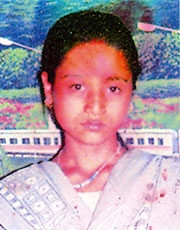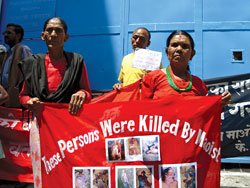|
|
It's been two years since the infamous extrajudicial killing of 15-year-old Maina Sunuwar by Nepal Army personnel. We're told her corpse has finally have been discovered this week, buried deep under the Pachkhal barracks' grounds.
The discovery gives Maina's mother Debi some hope of resolution, but there are fresh complications.
Debi will have little chance of finding peace in justice if the government passes the proposed Army Bill. Potentially, the new laws could prohibit civilian courts from trying army personnel even for grave rights abuses, extrajudicial executions, enforced disappearances, and torture. And if the army gets impunity, the Maoists are unlikely to agree to pay for their sins.
"I may not live to see Maina's killers punished, but I hope my fellow citizens and the new loktantrik political leaders will make sure it happens," said a tearful 50-year old Debi as she kissed a much-handled photograph of her daughters.
"Our biggest problem is impunity. Guilty soldiers often get away with crimes due to army protection," says Mandira Sharma of Advocacy Forum, which was also a key force in lobbying the UN to adopt the International Convention on Enforced Involuntary Disappearance back in June. Nepal is already under international pressure to ratify the convention, following which national legislation should be framed to start investigations into the forced disappearances and address past violations by both the state and Maoists.
It took three months for the Defence Ministry to finally announce that at some point the whereabouts of 49 detainees who 'disappeared' from the Bhairabnath Battalion would be made public. There are concerns that this might be all that happens, if the bill is passed.
The army says that passage of the bill, which has the support of the Defence Ministry, will help democratise the Nepal Army. But even debate about the proposed legislation ruffles feathers. Defence Secretary Bishnu Dutta Uprety is said to have been furious about public comment on the bill by the UN's Nepal human rights office. The OHCHR (Office of the High Commission for Human Rights) said that the bill fails to guarantee victims rights, including access to court martial proceedings and human rights protection for detainees.
 Sources say a team of forensic scientists from the UN will arrive in Nepal in a few weeks if the government starts exhuming the bodies of disappeared people. But an equal challenge is bringing the Maoists to book, and the UN is being closely watched for indications of how it will address torture, brutal killings, and disappearances caused by Maoists. Rough estimates say the army involved in 3,000 cases of extra judicial killings, but there is no data on similar violations by the rebels.
Sources say a team of forensic scientists from the UN will arrive in Nepal in a few weeks if the government starts exhuming the bodies of disappeared people. But an equal challenge is bringing the Maoists to book, and the UN is being closely watched for indications of how it will address torture, brutal killings, and disappearances caused by Maoists. Rough estimates say the army involved in 3,000 cases of extra judicial killings, but there is no data on similar violations by the rebels.
OHCHR says both sides must be held accountable for serious violations of human rights. "This is necessary to re-establish the rule of law, provide justice to victims and their families and send a clear message that there will no longer be impunity in Nepal," says David Johnson, officer-in-charge at OHCHR-Nepal, adding, "Holding those responsible for human rights violations is a key step in deterring potential abusers and preventing future violations, thus contributing to the peace process."
Activists say that the reality is, not one case of disappearance has been investigated yet. And once the investigations begin, there are no laws in place to determine standards for investigation, prosecution, compensation, and modes of sentencing. The peace talks so far have not discussed what such law might look like.
So far, diplomatic missions have kept mum about the Army Bill, which could potentially thwart transitional justice mechanisms, and have not raised the issue of impunity. However, some have flown in senior defence experts to discuss reform and democratisation of the Nepal Army, and the UK and the US defence ministries recently brought in teams to assess the country's security situation.
On Tuesday this week, Defence Secretary Uprety announced that five 'disappeared' persons had been released to their families, but a frustrated Bishnu Maya Rokka says she has no news of her husband, whose name is on the list.
Where is he? I haven't seen him yet," she shouted outside the army headquarters. Hira Bahadur Rokka was arrested three years ago in Kathmandu.
The Disappeared Families' Group plans more agitations, on 3 September they want to lock in Singha Darbar and hold a 5,000-strong rally until the whereabouts of all detainees and disappeared are revealed. "The home minister and prime minister just make promises, exactly like the National Human Rights Commission used to during the royal regime," complains the group's Sharmila Tripathi.



